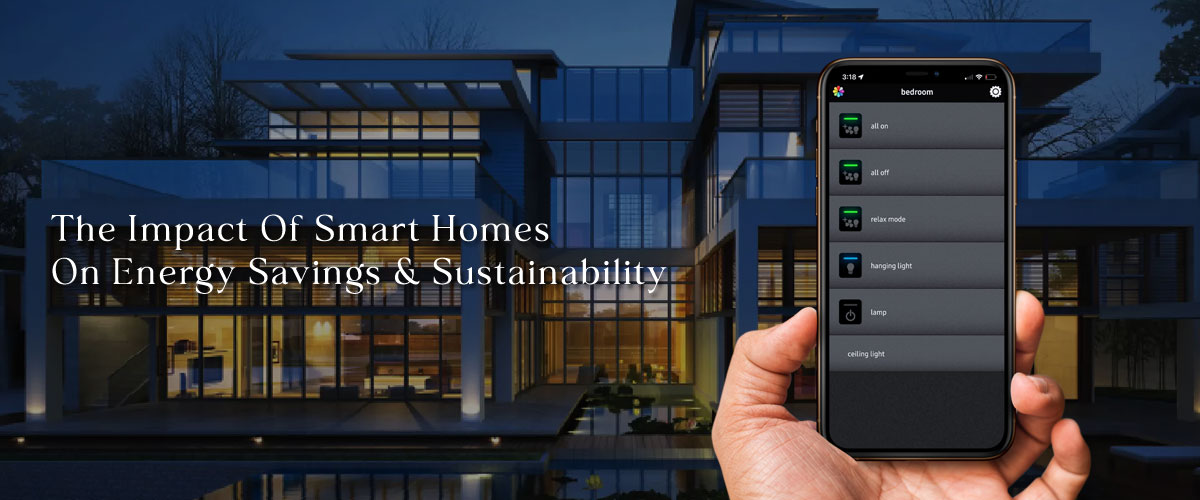A smart home is a residence equipped with advanced technology that allows homeowners to control and automate various aspects of their living environment, often through a smartphone, tablet or voice-controlled device. Smart homes make life more efficient, secure and enjoyable by leveraging cutting-edge technology to create a connected and intelligent living space. The concept of smart homes has gained significant traction, revolutionizing the way we live and interact with our living spaces.
Smart Home Energy Efficiency
Smart home energy efficiency is at the forefront of the smart living movement. By integrating intelligent systems and devices, smart homes optimize energy usage, reduce wastage and enhance overall efficiency. Here are some ways smart home technology contributes to energy efficiency:
1. Smart Thermostats:
These devices learn your preferences and adjust heating and cooling systems accordingly, ensuring optimal temperatures while minimizing energy consumption. Some even provide energy usage reports, helping homeowners make informed decisions. With the Arcus HA IR Blaster, you can effortlessly control your AC from anywhere, allowing you to maintain the perfect climate in your home with ease and convenience.
2. Energy Monitoring Systems:
These systems track and analyze energy consumption patterns, allowing homeowners to identify areas where they can cut back on usage. Real-time data empowers users to make adjustments and reduce their carbon footprint.
3. Smart Lighting:
Smart lighting systems use sensors and automation to turn lights on and off based on occupancy and natural light levels. This reduces unnecessary energy usage and lowers electricity bills. With the Arcus Dual Channel Dimmer Switch, you can easily manage your lights and fans as a basic ON/OFF switch, a dimmer or a fan regulator. It offers Wi-Fi connectivity for smart device integration and supports time-based customized scheduling for added convenience and efficiency.
4. Energy-Efficient Appliances:
Smart appliances, such as refrigerators, washing machines and dishwashers, are designed to operate more efficiently. They can be programmed to run during off-peak hours, further reducing energy costs. By scheduling your appliances, you can optimize energy usage. For instance, balcony lights can be turned off when you're not around, ensuring there's no unnecessary electricity consumption.
Smart Home Sustainability
Smart home sustainability goes beyond energy savings. It encompasses a holistic approach to creating an eco-friendly living environment. Many smart homes integrate renewable energy sources, such as solar panels and wind turbines. These systems can be monitored and managed through smart home platforms, ensuring efficient use of green energy.
Smart irrigation systems and water level detectors help conserve water by optimizing usage and detecting water levels. This is particularly important in regions facing water scarcity. Smart homes encourage sustainable living practices by providing insights into waste generation and promoting recycling and composting.
The Need for Sustainability
The effects of climate change are becoming increasingly evident, with rising temperatures, extreme weather events and melting ice caps. Sustainable practices can help mitigate these impacts by reducing greenhouse gas emissions. Our planet's resources are finite. Overconsumption and wasteful practices are depleting these resources at an alarming rate. Embracing sustainability ensures that future generations have access to essential resources.
Sustainable living promotes healthier lifestyles by reducing exposure to harmful pollutants and chemicals. It also encourages a connection with nature, which has been shown to improve mental and physical well-being. Sustainable practices often lead to cost savings in the long run. Energy-efficient homes, for example, can significantly reduce utility bills and increase property values.
The impact of smart homes on energy savings and sustainability is profound. By leveraging smart home energy efficiency and embracing sustainable living practices, we can create a greener, healthier and more resilient future. As technology continues to evolve, smart homes will play an even more significant role in shaping a sustainable world. By integrating smart home technology, we can take meaningful steps towards a more sustainable future, making a positive impact on our planet and ensuring a better quality of life for ourselves and future generations. Let's embrace smart home sustainability and work towards a greener tomorrow.

